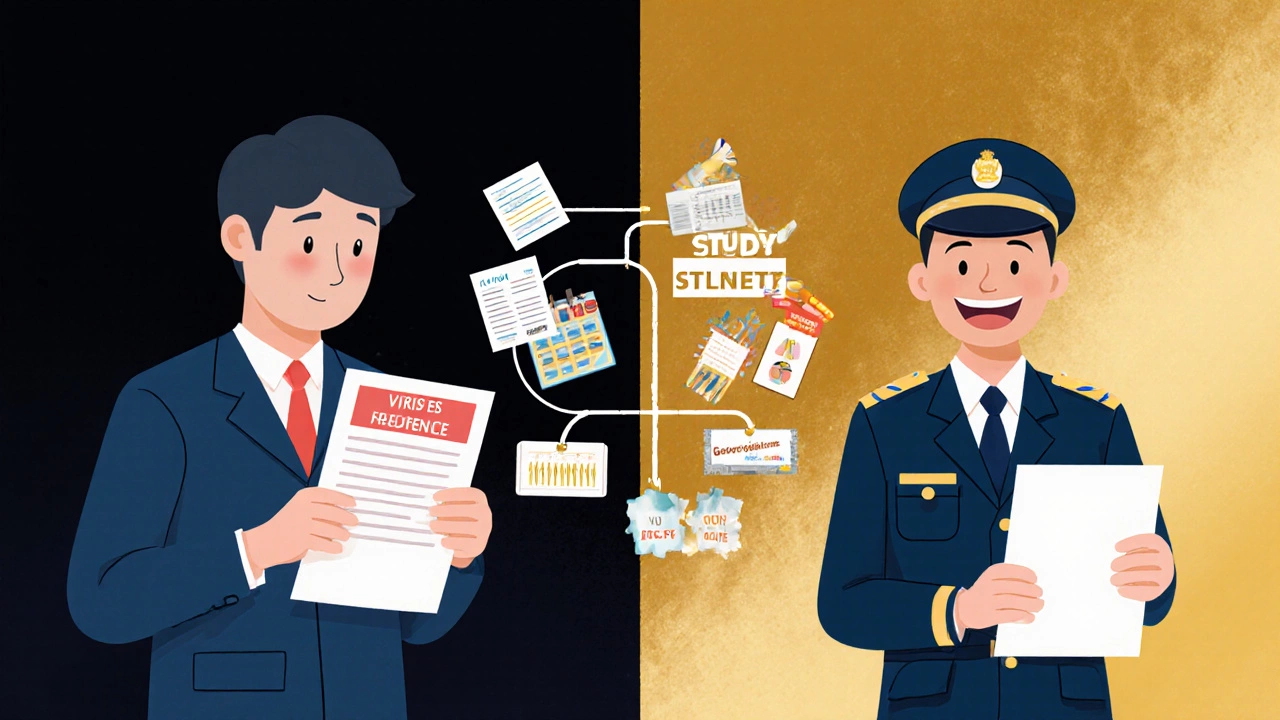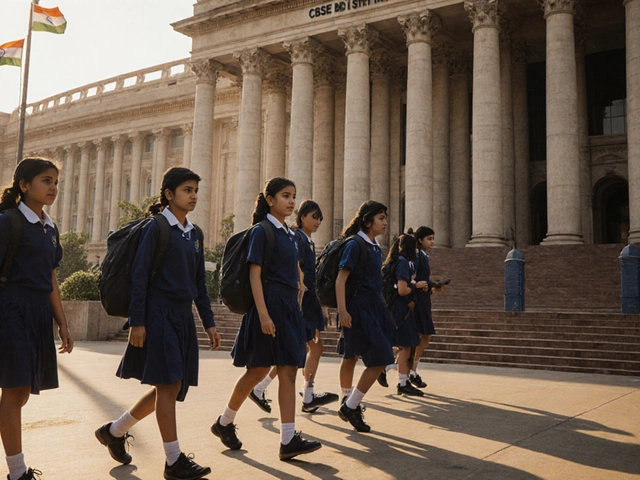Nov
16

- by Dhruv Ainsley
- 0 Comments
Government Job Success Calculator
Get a realistic estimate of your chances of securing a government job based on your preparation strategy. The calculator uses actual success rate data from across the world to provide personalized insights.
Your Application Details
How It Works
Based on your inputs, your success rate is calculated as:
Base Success Rate + (Preparation Time × 0.5%) + (Mock Tests × 0.1%) + (Consistency × 0.3%)
This formula uses real data from the article showing how preparation strategy impacts success rates across different government job exams.
Your Results
Estimated Success Rate
Personalized Recommendations
Every year, millions of people apply for government jobs. In India alone, over 20 million applications pour in for just 100,000 openings across central and state-level posts. That’s a 0.5% success rate. In the U.S., federal job applications often see 100+ applicants per role. In Australia, public sector roles can attract 300+ applications for a single position. The numbers don’t lie: getting a government job is hard. But it’s not impossible. And understanding the real odds is the first step to beating them.
Why Government Jobs Are So Competitive
Government jobs aren’t just about salary. They offer job security, pensions, healthcare, fixed hours, and little risk of layoffs. In times of economic uncertainty, these benefits become magnets. During the pandemic, applications for government roles in Canada jumped by 40%. In India, UPSC Civil Services saw a 50% surge in applicants between 2020 and 2023. The same trend shows up in Australia’s APS (Australian Public Service), where roles in health, education, and infrastructure are flooded with applicants.But here’s the catch: most applicants don’t prepare properly. They treat government exams like school tests. They memorize facts, skip mock tests, ignore time management, and assume hard work alone will win. That’s not how it works. You’re not competing against your classmates. You’re competing against thousands of people who’ve studied for two or three years full-time.
What the Numbers Really Show
Let’s break down real success rates from recent data:- UPSC Civil Services (India): Around 1,000 candidates are selected from 1.1 million applicants. That’s a 0.09% success rate.
- SSC CGL (India): Over 5 million applications for 10,000 posts. Success rate: 0.2%.
- U.S. Federal Jobs (USAJobs.gov): Average of 120 applicants per posting. Only 5-10% make it to the interview stage.
- Australian Public Service (APS): 250-400 applicants per role. About 15% are shortlisted; only 3-5% get hired.
- UK Civil Service Fast Stream: 15,000 applicants for 1,000 spots. Selection rate: 6.7%.
These aren’t just numbers. They’re signals. If you’re applying without a strategy, you’re statistically likely to fail. But if you know what separates the winners from the rest, your odds change.
What Makes Someone Successful
The top 5% of candidates who get government jobs don’t just study harder. They study smarter. Here’s what they do differently:- They start early and stick to a schedule. Most successful applicants begin preparing 12-18 months before the exam. They don’t cram. They build habits.
- They take full-length mock tests weekly. Mock tests aren’t practice-they’re diagnostics. Top performers analyze every wrong answer. They track speed, accuracy, and fatigue patterns.
- They focus on high-yield topics. In UPSC, 30% of questions come from 10% of the syllabus. In SSC CGL, Quantitative Aptitude and Reasoning make up 60% of the marks. Knowing where to focus cuts study time in half.
- They understand the interview process. In India, UPSC interviews test personality, not memorization. In Australia, APS interviews use behavioral questions based on core values. You can’t wing it.
- They network and get feedback. Successful candidates join study groups, talk to past qualifiers, and get their answer scripts reviewed. They don’t work in isolation.
One applicant from Delhi, who cleared UPSC in his third attempt, told me: “I failed twice because I thought I was ready. On my third try, I asked five people who’d passed to review my answers. That’s what changed everything.”

How to Improve Your Odds
If you’re serious about getting a government job, here’s your action plan:- Choose your target wisely. Don’t apply for everything. Pick 2-3 roles that match your background. A B.Com graduate should focus on SSC CGL or bank exams, not UPSC Indian Forest Service.
- Study the last 5 years’ question papers. Patterns repeat. In U.S. federal exams, 70% of questions come from previously asked topics. In India, static GK repeats almost word-for-word.
- Build a 12-month study plan. Divide your time: 40% for core subjects, 30% for mocks, 20% for revision, 10% for current affairs. Stick to it.
- Track your progress. Use a simple spreadsheet: date, test score, weak areas, improvement. You can’t improve what you don’t measure.
- Prepare for the interview from day one. Practice answering: “Tell me about yourself,” “Why this job?”, “What’s your biggest failure?” Record yourself. Watch it. Fix it.
Common Mistakes That Kill Your Chances
Most applicants lose because of avoidable errors:- Waiting for the perfect time. There’s no perfect time. The person who starts today beats the one who plans to start next month.
- Over-relying on coaching institutes. Coaching helps, but only if you do the work. Many students attend classes but never revise.
- Ignoring current affairs. In Australia’s APS, 20% of written tests include questions on recent government policies. In India, UPSC papers now include questions on budget allocations from the last 6 months.
- Not reading the official notification. People apply without checking eligibility. One applicant in Mumbai applied for a 10th-pass job-she had a PhD. She was disqualified on technical grounds.
- Giving up after one failure. The average UPSC topper clears it on their third attempt. The average APS applicant applies twice before succeeding.

Is It Worth It?
Let’s be real. The journey is long. It’s stressful. You’ll face doubt. Your friends might move ahead in private sector jobs. You might feel behind. But the payoff is real.In India, a Grade A officer earns ₹80,000-1,20,000/month with housing and medical benefits. In Australia, an APS Level 6 officer earns AUD $95,000-120,000 with superannuation and 20 days’ leave. In the U.S., a GS-12 federal employee earns $85,000-110,000 with full benefits and pension.
These aren’t just salaries. They’re stability. They’re peace of mind. They’re the ability to plan for the future without fear.
If you’re willing to put in the work, the odds shift in your favor. Not because the system is fair. But because most people quit before they get close.
Final Reality Check
You won’t get a government job because you’re smart. You’ll get it because you’re consistent. Because you showed up every day. Because you learned from your mistakes. Because you didn’t give up when others did.The system is competitive. But it’s not rigged. It rewards preparation. It rewards discipline. It rewards persistence.
If you’re reading this, you’re already ahead of 90% of the people who just dream about it.
What’s the success rate for government jobs in India?
Success rates vary by exam. For UPSC Civil Services, only about 0.09% of applicants get selected. For SSC CGL, it’s around 0.2%. Even for state-level exams, the success rate rarely exceeds 1%. These numbers reflect intense competition, not lack of opportunity. The key is targeted preparation and persistence.
How long should I prepare for a government job exam?
Most successful candidates prepare for 12 to 18 months. This allows time to cover the full syllabus, take weekly mock tests, revise weak areas, and build exam stamina. Some start even earlier, especially for exams like UPSC that have a vast syllabus. Six months is possible for simpler exams like SSC CHSL, but it’s risky.
Can I get a government job without coaching?
Yes, many people clear government exams without coaching. In fact, a large number of UPSC toppers are self-studiers. What matters is discipline, access to quality study material, regular mock tests, and feedback. Coaching can help with structure, but it won’t replace your effort.
Are government jobs better than private sector jobs?
It depends on what you value. Government jobs offer job security, pensions, healthcare, and work-life balance. Private sector jobs often offer higher salaries, faster promotions, and more innovation-but less stability. If you prioritize long-term security over rapid growth, government jobs are a strong choice.
What’s the easiest government job to get?
There’s no truly easy government job, but some have higher selection rates. In India, SSC CHSL (Lower Division Clerk) and RRB NTPC have fewer applicants per seat than UPSC or SSC CGL. In Australia, entry-level APS roles in administrative support or customer service have higher hiring rates than competitive graduate programs. Still, competition remains high-don’t assume they’re easy.
Do government jobs require a degree?
Most require at least a bachelor’s degree, but some roles accept 10th or 12th pass. For example, SSC MTS and RRB Group D in India accept 10th pass. In Australia, some APS roles require only a certificate or diploma. Always check the official notification. Eligibility varies by role, department, and country.
How many attempts are allowed for government exams?
It varies. UPSC allows 6 attempts for general category candidates until age 32. SSC CGL has no fixed limit as long as you’re under the age limit (usually 30-32). In Australia, there’s no limit on APS applications-you can reapply every year. The key is to learn from each attempt and improve your strategy.
Is age a barrier to getting a government job?
Age limits exist, but they’re not always strict. Many exams have age relaxations for reserved categories, women, and people with disabilities. In India, UPSC allows up to age 37 for OBC candidates. In Australia, there’s no upper age limit for most APS roles. What matters more than age is your ability to perform. Many successful applicants are in their late 30s or early 40s.
What’s the best way to stay updated on government job openings?
Subscribe to official portals: ssc.nic.in for India, jobs.gov.au for Australia, USAJobs.gov for the U.S. Set up alerts. Follow trusted government news sources. Avoid third-party sites that sell fake notifications. The real notifications are always free and published on official websites.
Can I apply for government jobs in another country?
Yes, but it’s much harder. Most countries prioritize citizens or permanent residents. Australia’s APS requires Australian citizenship for most roles. The U.S. federal jobs require U.S. citizenship. Some international organizations like the UN or WHO hire globally, but they’re highly competitive. If you’re not a citizen, focus on local opportunities first.
Getting a government job isn’t about luck. It’s about showing up, day after day, even when no one’s watching. The system doesn’t reward the loudest. It rewards the most consistent.





